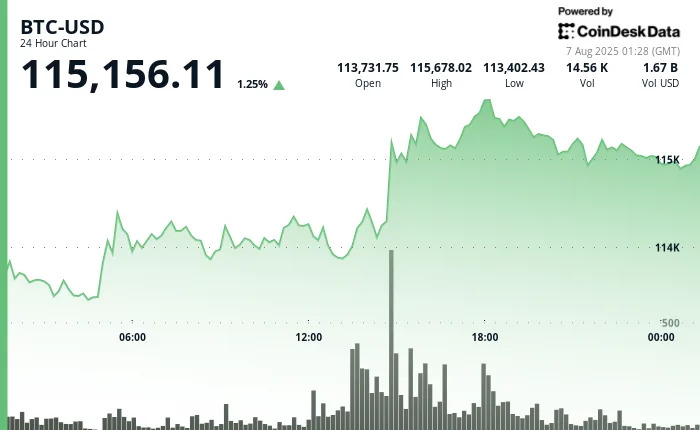
Asia Morning Briefing: Bitcoin Slips Into Low-Liquidity 'Air Gap' as Post-ATH Drift Continues
Key Points
- Bitcoin (BTC) Stability: BTC is hovering around $115,000 in Asia, up 1% in the last 24 hours, amidst a post-all-time-high correction with low volume and weak market conviction.**
- Low-Liquidity Zone: According to Glassnode, BTC is in an “air gap” between $110,000 and $116,000, a low-liquidity zone that could either support accumulation or lead to further declines if demand weakens.**
- Market Sentiment: Short-term holder profitability has fallen from 100% to 70%, and negative ETF flows (1,500 BTC outflow) alongside cooled funding rates indicate cautious trader sentiment.**
- Ethereum (ETH) Performance: ETH is up 2%, trading just below $3,600, while facing significant sell pressure and bearish signals that could lead to a 25–35% decline by September.**
- Market Outlook: The crypto market remains fragile, with BTC and ETH struggling to regain strength; the next move depends on buyer willingness to build a base or a potential drop to $110,000.**
Summary
Bitcoin (BTC) is trading around $115,000 in Asia, up 1% in the last 24 hours, as it navigates a post-all-time-high correction with low volume and weak conviction. Glassnode identifies BTC in a low-liquidity “air gap” between $110,000 and $116,000, a critical zone that could either support accumulation or trigger deeper declines if demand falters. Short-term holder profitability has dropped from 100% to 70%, and negative ETF flows, including a 1,500 BTC outflow, reflect cautious sentiment, alongside reduced leverage in derivatives markets. Ethereum (ETH) is up 2% at just under $3,600 but faces significant sell pressure and bearish signals, risking a 25–35% drop by September. The broader crypto market, tracked by the CoinDesk 20 Index (up 1.69%), remains fragile, with analysts noting a lack of confidence in majors like BTC and ETH. Market makers suggest a sideways or downward trend unless volume-driven strength emerges. Meanwhile, external factors like U.S. semiconductor tariffs and Fed rate cut speculations impact related markets, with gold flat at $3,372.11 and Asia-Pacific indices like the Nikkei 225 showing mixed responses. The crypto market’s next direction hinges on whether buyers can establish a base in this low-volume zone or if a reset toward $110,000 is needed.
yahoo
August 7, 2025
Crypto


